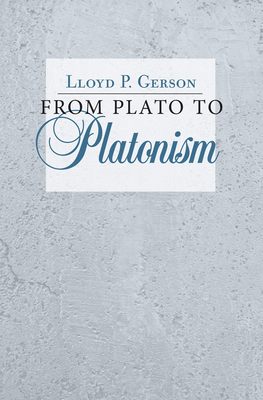From Plato to Platonism

From Plato to Platonism
Was Plato a Platonist? While ancient disciples of Plato would have answered this question in the affirmative, modern scholars have generally denied that Plato's own philosophy was in substantial agreement with that of the Platonists of succeeding centuries. In From Plato to Platonism, Lloyd P. Gerson argues that the ancients were correct in their assessment. He arrives at this conclusion in an especially ingenious manner, challenging fundamental assumptions about how Plato's teachings have come to be understood. Through deft readings of the philosophical principles found in Plato's dialogues and in the Platonic tradition beginning with Aristotle, he shows that Platonism, broadly conceived, is the polar opposite of naturalism and that the history of philosophy from Plato until the seventeenth century was the history of various efforts to find the most consistent and complete version of "anti-naturalism."Gerson contends that the philosophical position of Plato--Plato's own Platonism, so to speak--was produced out of a matrix he calls "Ur-Platonism." According to Gerson, Ur-Platonism is the conjunction of five "antis" that in total arrive at anti-naturalism: anti-nominalism, anti-mechanism, anti-materialism, anti-relativism, and anti-skepticism. Plato's Platonism is an attempt to construct the most consistent and defensible positive system uniting the five "antis." It is also the system that all later Platonists throughout Antiquity attributed to Plato when countering attacks from critics including Peripatetics, Stoics, and Sceptics. In conclusion, Gerson shows that Late Antique philosophers such as Proclus were right in regarding Plotinus as "the great exegete of the Platonic revelation."
PRP: 269.91 Lei
Acesta este Prețul Recomandat de Producător. Prețul de vânzare al produsului este afișat mai jos.
242.92Lei
242.92Lei
269.91 LeiLivrare in 2-4 saptamani
Descrierea produsului
Was Plato a Platonist? While ancient disciples of Plato would have answered this question in the affirmative, modern scholars have generally denied that Plato's own philosophy was in substantial agreement with that of the Platonists of succeeding centuries. In From Plato to Platonism, Lloyd P. Gerson argues that the ancients were correct in their assessment. He arrives at this conclusion in an especially ingenious manner, challenging fundamental assumptions about how Plato's teachings have come to be understood. Through deft readings of the philosophical principles found in Plato's dialogues and in the Platonic tradition beginning with Aristotle, he shows that Platonism, broadly conceived, is the polar opposite of naturalism and that the history of philosophy from Plato until the seventeenth century was the history of various efforts to find the most consistent and complete version of "anti-naturalism."Gerson contends that the philosophical position of Plato--Plato's own Platonism, so to speak--was produced out of a matrix he calls "Ur-Platonism." According to Gerson, Ur-Platonism is the conjunction of five "antis" that in total arrive at anti-naturalism: anti-nominalism, anti-mechanism, anti-materialism, anti-relativism, and anti-skepticism. Plato's Platonism is an attempt to construct the most consistent and defensible positive system uniting the five "antis." It is also the system that all later Platonists throughout Antiquity attributed to Plato when countering attacks from critics including Peripatetics, Stoics, and Sceptics. In conclusion, Gerson shows that Late Antique philosophers such as Proclus were right in regarding Plotinus as "the great exegete of the Platonic revelation."
Detaliile produsului










